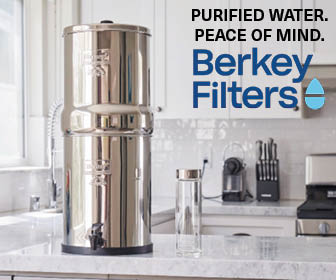.jpg) According to the EWG, about 85% of the American population is drinking water that contains more than 300 contaminants.
According to the EWG, about 85% of the American population is drinking water that contains more than 300 contaminants.
Isn’t that insane?
What’s worse, many of the contaminants are not regulated by the EPA. Some of these are harmful toxins including lead, mercury, arsenic, and antibiotics. In addition, conventional farming runoff has also polluted drinking water with pesticides, fertilizers, and animal waste. I think we can all agree that those contaminants are dangerous (and gross) and not healthy, so I won’t spend time sharing about the negative consequences of ingesting them. They’re just bad. The bottom line is that we drink water to support our health, not make us sick!
EWG maintains a Tap Water Database that offers users the ability to check the known water contaminants in their area. It’s not all-encompassing for every location, but it’s an incredible resource to get an idea of the known water contaminants in particular areas.
.jpg) In addition to possible contaminants, drinking water is also often treated with a couple concerning additives – chlorine and fluoride:
In addition to possible contaminants, drinking water is also often treated with a couple concerning additives – chlorine and fluoride:
- Chlorination is used to “clean” water and kill potential bacteria. Though that sounds like a good idea, chlorine is not healthy and has been associated with an increased risk of cancer tumor development. Plus, it’s just gross. Especially now that I’ve been drinking filtered water for a long time, I can smell chlorination in tap water, which is why I carry my own water with me whenever I can. I personally think water should just taste like water!
- Fluoridation is widely added to drinking water in an attempt to reduce tooth decay, but the rationale is based on assumptions from outdated information. Despite the compelling modern evidence that fluoride is a neurotoxin, it is still added to water in the name of public health. This absolutely boggles my mind, especially when plenty of studies link fluoride to hyperthyroidism, ADHD, low IQ, dental and skeletal fluorosis, depression and weight gain, as well as chronic fatigue, memory loss, and possibly even bone cancer. The authors of a 2014 study concluded “that available evidence suggests that fluoride has a potential to cause major adverse human health problems, while having only a modest dental caries prevention effect.” Moreover, a 2000 study actually suggests that dental cavities decreased after water fluoridation ceased!
So what can we do?
If you are now questioning your water source (I hope you are!), there are some things you can do. First, you could consider commissioning an independent lab to analyze a sample of your water so you know exactly what’s it contains. Or, you could put the investment toward a quality water filter. There are a large variety of filters that come in different sizes and do different things. It’s important to research them to figure out what works best for your situation. Some options include pitchers, faucet filters, under sink water filters, reverse osmosis filters, and my personal favorite, Berkey Water Filters. They’re a bit of an investment up front, but Berkeys sit on the counter and are so easy to use. They are gravity-powered, meaning they still work if the electricity goes out. They filter out lots of the stuff that we shouldn’t be putting into our bodies (including chlorine and fluoride) while preserving the good minerals we need.
*UPDATE DECEMBER 2023 – a lot of the Berkey products have been unavailable – so if you’re looking for another option, I really like Clearly Filtered as well.

And of course, if you decide to have your water tested for contaminants, you could do a search for water filters that are strong in filtering out the contaminants particular to your water. It should, in my opinion, definitely be able to filter out fluoride and chlorine though.
Skip bottled water when possible, as it’s not stringently regulated and often not much safer than tap water. Also, all those plastic bottles are just terrible for the environment and plastic leaching is not good for us either. Instead, opt for a sturdy stainless steel or glass water bottle to carry your home-filtered water wherever you go. (And if your only option is bottled water, choose spring over purified whenever possible – Fiji is the best.)
Bottom line. Water sources are an important consideration in our journeys toward natural health. Because most of us don’t have access to truly natural spring water, filtering can be a great way to mitigate potential contaminants.






